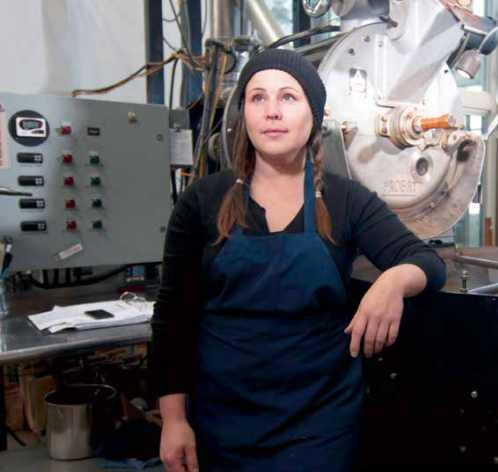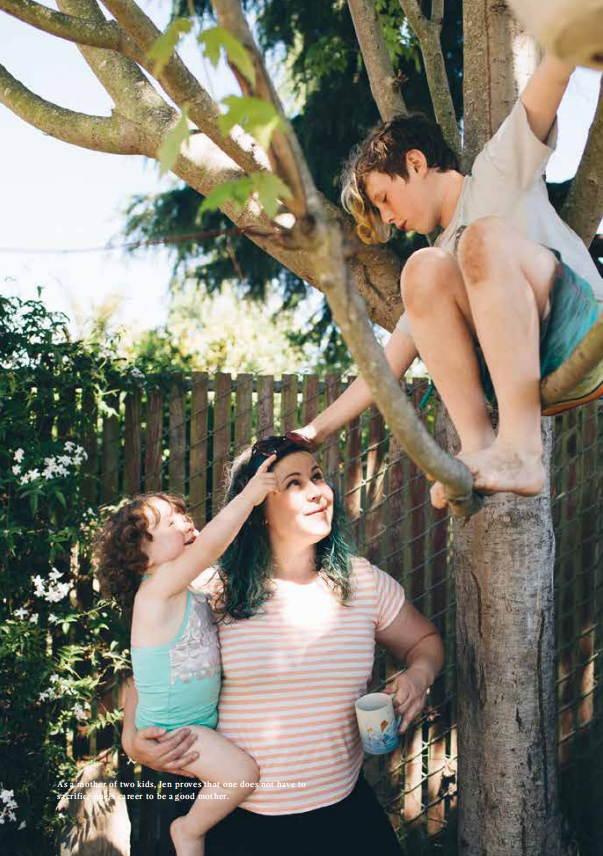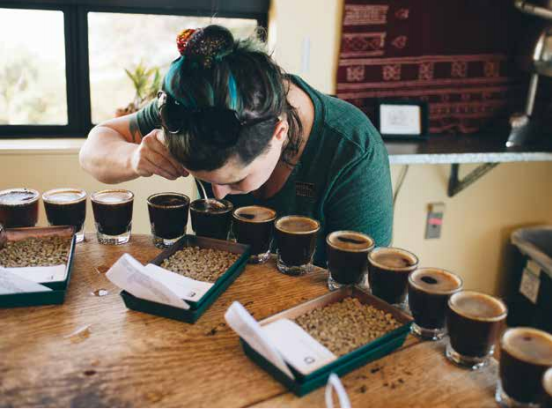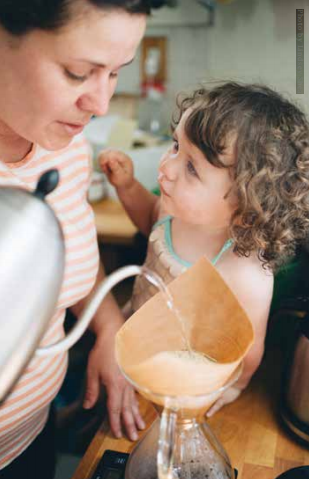To be known as an excellent roaster, not a woman roaster

Could you please tell us more about yourself?
My name is Jen Apodaca and I have been roasting coffee since 2004. After roasting coffee for five years with McMenamins Pubs & Breweries in Portland, Oregon, I moved back to California to work as a Production Roaster & Quality Control Specialist with Intelligentsia Coffee. Three years later I took a position with Blue Bottle Coffee as their West Coast Production Manager and ran their largest roasting operation in Oakland, California. Today, I am working as the Director of Roasting for the importing company Royal Coffee. Over the years I have served several years as a Cup of Excellence International Juror and I am a certified Q Grader. I volunteer with the SCA and I am the Vice Chair of the Coffee Roasters Guild. So far 2019, is a very exciting year for me. I am currently competing in the United States Roasting Competition and the United States Cup Tasters Competition.
Where are you from and how is the coffee culture there?
I live in Oakland, California and I am fortunate to be a part of an active and collaborative coffee community. Through groups like the Bay Area Roaster Friends and the Bay Area Coffee Community there has been regional events for over a decade. Sometimes they are more elaborate like a roasting competition or expert panel discussions. A great example of this is the Bay Area Prep Rally event that we hosted at The Crown on March 2nd. Several companies came together to help all of the Bay Area competitors practice run through for the Roasting, Barista, Cup Tasters and Brewer’s Competition. It was so much fun and such a positive experience. Several other coffee community groups have also popped up all over the country offering similar events. I think that creating these spaces and alliances shows a certain maturity that we have reached in specialty coffee.
What was life before entering coffee industry?
I did not start roasting coffee until I was 26 years old. I studied Sociology and Women’s Studies in university and I was involved in a lot of political activism in my early twenties. I have worked lots of jobs: bookeeping, delivery driver, forklift operator, warehouse & distribution manager, whatever would let me earn enough money so that I could travel abroad. It was on one of my trips that I worked in the Zapatista community in Chiapas Mexico. I spent several weeks with the people there and learned that they grow coffee. When I returned to the United States I decided to learn how to roast coffee so that I might be able to keep working with them.

Did you work for other coffee chain brand before? What’s the most challenges for you from different places or position?
Intelligentsia and Blue Bottle were both very large operations and while the coffee culture and flavors were different, logistically they were very similar. Both companies had multiple roasting operations. The best part of working for a large roasting company with multiple roasting locations is that you have lots of support developing profiles among your peers, Both companies utilize cupping exchanges to help maintain a consistency in flavor. If I ever ran into a problem with a coffee, I could always call a colleague who was having success with that coffee to give me some tips. The challenging part is creating a cohesive flavor when you have different roasters, weather and humidity, and sometimes different lots of the same coffees in your blends. It takes a lot of coordination and communication, everyone needs to be involved for a company to succeed.
As a female roaster, what’s the most challenge part of your career?
It is challenging to take your job seriously when you constantly need to reassert your position in a company. So many times I have been completely ignored while others assume that male colleague is the roaster or my boss. Now that I am older it happens less often, but it was infuriating when I was younger. The other major challenge is when call you to talk to you about being a woman roaster, but fail to talk to you about roasting. I remember reading an article that highlighted women roasters in a magazine several years ago that gave a portrait of three women in coffee and I was relieved that I wasn’t asked to be a part of it.
It’s said that you are the founder of #shesthroaster campaign, could you please tell us more about that ? What inspires you most about this project?
I started the hashtag campaign #shestheroaster through my work on the Roasters Guild and it was very successful. The hashtag was to create visibility for women roasters in the industry, that there are already brilliant women roasting coffee that you maybe drinking right now. It was during the US Roasting Competition three years ago that the emcee asked all 40 roaster competitors to the stage for a round of applause. It was staggering to me that all 40 competitors were men and I knew that I needed to do something about it. By creating the hashtag and having a place where we see ourselves taking up space, I think it helped encourage more women to speak up about wanting to roast coffee and it validated the experience that several women already had. Two years ago, Talor Browne of Norway and Joanna Alm of Sweden reached out to me to do something with education for women to become roasters. The three of us had a ton of experience and we wanted to use it to serve our community. We started the organization shestheroaster.org to promote and encourage self-identifying women in the coffee industry to become professional coffee roasters. For the last two years we have held several lectures at major coffee events and have sponsored scholarships.

From your experience, what are the biggest challenges female roaster facing in the United States? Do you want to do something to change?
The first challenge that women roasters face in the United States is recognition and visibility. The next challenge we need to tackle is convincing companies that hire roasters that women make excellent roasters and can do the work. A lot of people still resort to sexist stereotypes like women are not strong enough or men are better at math when they make hiring decisions and it is just simply untrue. I can’t wait for a future where we will no longer need a hashtag like #shestheroaster. I do a lot of work talking to male colleagues about sexual harassment or their implicit biases. I also talk to women from all over coffee about how to get into roasting and the challenges they face once they get there. Having an ear or an advocate that will help you grow and get promoted in your profession is crucial for success.
Have you ever tried Asian roaster’s bean ? what’s the biggest difference from Asian roastery and USA ? and Why?
My experience of the coffee culture in Asia is very limited, but I see so much energy and excitement. When I worked with Blue Bottle I worked on the opening of the Roastery in Tokyo. I had a great time going to several cafes and I noticed that most of the coffees were very Nordic inspired and mostly lightly roasted with super clean acidity. In Korea, they have formed their first SCA chapter and they have so many amazing events in the works. It is one thing to see more specialty roasters and cafes, but when you also see a community grow and organize it is really special. In China, I was fortunate enough to teach a roasting class in Beijing and attend Hotelex in Shanghai last year. While working at the trade show, several women roasters came up to talk to me and express some interest in doing an educational event in China.
From a consumer’s point of view, do you have some suggestion for roasters?
As a professional coffee person, I think that many of our cafes have lost that community feel. Most shops are very clean and sterile with customers isolated on laptops. There are no more community boards for people to put up notices or a corner with free books, games, or children’s toys. I would love to see coffee become a part of the community again and become a safe space that interacts with its customers more.
Is there any key things that people who want to be roasters need to know?
When I started roasting there was not a lot of information about roasting. These days there are books, classes, forums everywhere. I have had very detailed conversations with people about roasting who still have yet to touch a roaster. I think that the dissemination of information about roasting is great so people have access to power, but it has also created a community of experts that have no experience. I read things all the time that do not always measure up with what I have experienced over the last fifteen years of my career. I would just say to aspiring roasters that there is no replacement for putting actual time on the roasting machine.

Job Experience
2004.5-2010.8 Coffee Director for McMenamins Inc.
2010.8-2013.7 Coffee Roaster & Quality Control Specialist for Intelligentsia Coffee & Tea
2013.7-2015.11 West Coast Production Manager for Blue Bottle Coffee Co.
2015.11-now Director of Roasting of The Crown: Royal Coffee Lab & Tasting Room for Royal Coffee Inc. 2019 USA Cup Taster Champion









NO COMMENT